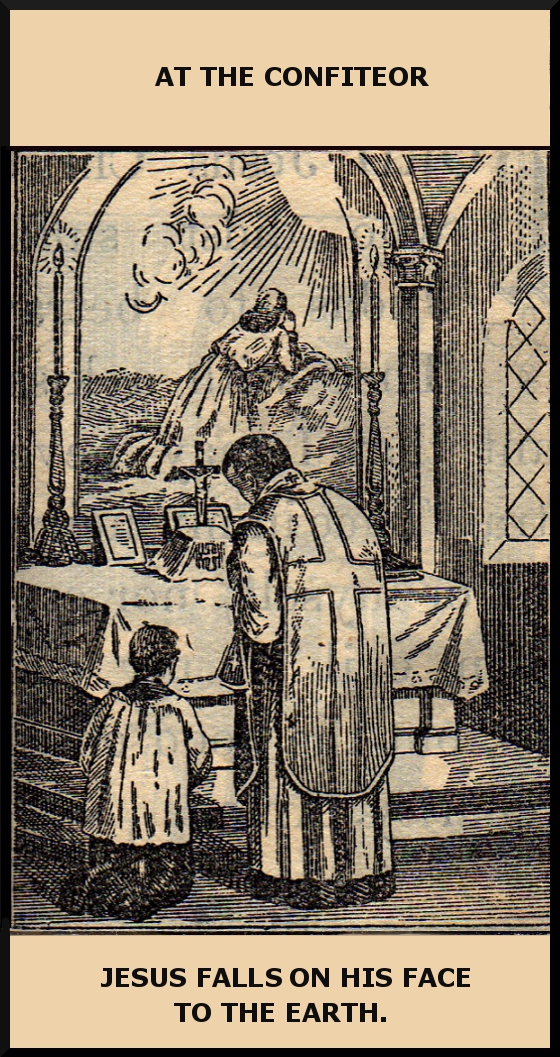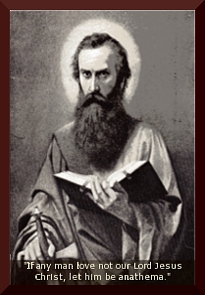 The Confiteor is prayed twice, first by the priest to confess his sinfulness, then by the server with whom we unite our hearts to confess ours. Both assume the posture of a profound bow while asking God’s forgiveness. We recall our Lord dropping to the ground and sweating blood as He assumes the weight of our sins.
The Confiteor is prayed twice, first by the priest to confess his sinfulness, then by the server with whom we unite our hearts to confess ours. Both assume the posture of a profound bow while asking God’s forgiveness. We recall our Lord dropping to the ground and sweating blood as He assumes the weight of our sins.
P. I confess to Almighty God, to Blessed Mary ever Virgin, to Blessed Michael the Archangel, to Blessed John the Baptist, to the Holy Apostles Peter and Paul, to all the angels and saints, and to you my brothers and sisters, that I have sinned exceedingly in thought, word, deed. (He strikes his breast three times saying) through my fault, through my fault, through my most grievous fault, and I ask Blessed Mary ever Virgin, Blessed Michael the Archangel, Blessed John the Baptist, the Holy Apostles Peter and Paul, all the Angels and Saints, and you my brothers and sisters, to pray for me to the Lord our God.
In the N.O. the priest and the congregation face each other while doing a “Penitential rite” together. A shortened Confiteor is one of the options.




In religious orders made up solely of one sex, in this example, of men, is it still appropriate to include “and sisters,” when saying “and you my brothers and sisters”?
There is a discussion right now in my community about this, (of brothers only, no clerics at this time) because we use to only say, “and you my brothers” when only men were present, and included “and sisters” when women were present as well. We also pray the confiteor to begin Compline, and the same scenario exists there as well.
Recently, two separate diocesan clerics have told us that we need to include “sisters” when praying the confiteor in both the mass (we celebrate OF, though our visiting priest celebrates EF at the parish he serves at) and Compline, because we are praying in union with the Universal Church, and we are asking our brothers and sisters who may not be present in body in the very building we are in, to pray for us to the Lord our God. They argue that excluding “sisters” when none are physically present takes away from the universality of the prayer and is therefore theologically incorrect.
Some of us however note that the Instructions in the Roman Breviary itself state that for night prayer, when one is praying alone a brief examination of conscience is to be employed, while a communal celebration of the office could include the confiteor. This would seem to suggest that when praying physically alone, it would make no sense to prayer the confiteor, since there are no brothers or sisters present, while praying in community setting, a confiteor would be allowed since there are brothers and/or sisters present. Which begs the question, if one is not to pray the confiteor if praying the office alone since no brothers or sisters are physically present, then should we adapt our praying of the confiteor to appeal to the prayers of only our brothers if no women are present?
In most religious houses I have visited, this is exactly the case, that only brothers are included in the confiteor when only brothers are physically present. However, this argument is met with the rebuttal that it is only customary to omit the confiteor when praying alone, that it would still be correct and even theologically encouraged to pray confiteor when alone, therefore the question of whether brothers and/or sisters are physically present is moot, since the prayer is directed through the Universal Church and does not rely on those physically present.
What adds to the confusion is that at the end of Compline, after we have asked for the prayers of our brothers who are physically present “and sisters” who are not, we end by asking for “God’s help to remain with us always, and with our brothers who are away.” So in one part, through the confiteor, we are asking for prayers of those of the Church Militant who are not physically present, and yet feel the need to acknowledge they aren’t physically present by praying for our brothers “who are away.”
Obviously from my presentation of the argument, you can tell where I currently stand. I would like to know what is correct here. The common solution would be to simply pray “and you my brethren” but that solution has been tossed out, but it only appeases (a kind of political correctness if you will) and does not address the theological correctness at hand.
Any light you could shine on this would be of great help.
Thank you and God Bless.
-Br. Bonaventure Rider, fbp